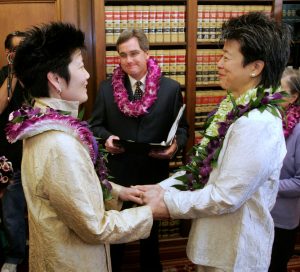 Issue could appear on ballot in as many as 6 states this year
Issue could appear on ballot in as many as 6 states this year
NEW YORK — Same-sex marriage is back in the political spotlight and likely to remain there through Election Day in November as a half-dozen states face potentially wrenching votes on the issue.
In New Hampshire, Republicans who now control the legislature are mulling whether to repeal the 2009 law legalizing same-sex marriage. Their state is one of six with such laws, along with Connecticut, Iowa, Massachusetts, New York and Vermont, as well as the capital district of Washington.
In Maryland, New Jersey and Washington state, bills to legalize same-sex marriage have high-powered support and good chances of passage in the legislature. Gay-marriage opponents in Maryland and Washington would likely react by seeking referendums in November to overturn those laws, while New Jersey’s Republican governor, Chris Christie, says he’ll veto the bill if it reaches him and prefers that lawmakers OK a referendum so voters can decide.
In all three states, polls suggest voters are closely divided on whether gays should have the right to marry, so there’s a chance one could emerge as the first state to support same-sex marriage in a statewide vote.
Three of the remaining Republican presidential contenders, Mitt Romney, Newt Gingrich and Rick Santorum, have signed a National Organization for Marriage pledge opposing same-sex marriage and endorsing a federal constitutional amendment to ban it. But it’s not among the topics prominent in the stump speeches of Romney or Newt Gingrich, the two front-runners.
On the Democratic side, President Barack Obama has taken several steps during his first term that have pleased gay-rights advocates, but says he is still “evolving” in regard to same-sex marriage and isn’t ready to endorse it. Some activists hope he will do so before the election, though there’s been no strong hint of that from the White House.
“Obama will get asked about it, and you can’t straddle both sides of this forever,” said Richard Socarides, a former Clinton White House adviser on gay rights. “Clearly he’s not going to retreat, so he only has one place to go, and I think he will do it before the election.”
Maine voters also may have an opportunity to vote for same-sex marriage in November; gay-rights activists announced Thursday they are moving forward with a ballot-measure campaign, submitting more than 105,000 signatures to the Secretary of State. Proposed amendments for constitutional bans on gay marriage will be on the ballots in North Carolina on May 8 and in Minnesota on Nov. 6.
Added together, the state-level showdowns will likely raise the prominence of the marriage issue in the presidential campaign, even though it’s not a topic that the leading candidates tend to broach proactively.
Another potential factor: Judgments could be issued during the campaign in one or more of several pending federal court cases about same-sex marriage. Appeals could result in the issue heading toward the Supreme Court, and the presidential candidates would be expected to comment on any major development.
In all the showdown states, national advocacy groups are expected to be active on both sides. The Human Rights Campaign, for example, has promised to provide funding, strategic advice and field staff for the various campaigns supporting same-sex marriage.
On the other side, the National Organization for Marriage is vowing a multistate effort, including promises of financial support in the primaries to defeat any Republican lawmakers who support gay marriage in Washington.
Though several major national polls now show that a slight majority of Americans support same-sex marriage, National Organization for Marriage president Brian Brown predicts his side will continue its winning streak and prevail in any state referendums that are held this November.
“There’s a myth that history is on a trajectory moving toward same-sex marriage,” Brown said. “There is no such momentum.”
















Why not get government out of our personal lives?. A good start would be equalizing taxes among marrieds and non marrieds, thereby eliminating the need for a definition of marriage at the Federal and state levels. Then we can all keep our definition of marriage to ourselves. No, I’m not gay or Democrat (getting there) – but I am ashamed at the many advantages I’ve had because of my marital status and that this argument even continues in all its’ absurdity. The pain inflicted on our LGBT sisters and brothers is immeasurable and unconscionable. Does that make me a godless pagan or am I just more attuned to the doctrine of “love one another”? Grow up and get out of your glass house Newt. What happened to the fundamental separation of church and state? Politicians who invoke Christianity and their own godliness in their campaigns should be banned from further practice of politics.